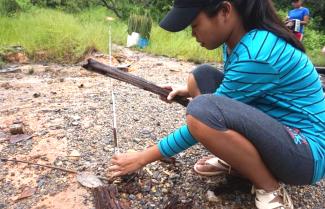The project contributed to the formation of resilient Tagbanwa communities and ancestral domains wherein the indigenous peoples' political, economic and cultural governance are strengthened to ensure the integrity of the biodiversity and ecosystem services of their landscapes and seascapes, and adapted to changing climate regimes. In particular, it enhanced the capacity of Tagbanwa Women and Youth leaders from the communities of the Decabobo-San Nicolas-Decalachao-San Jose-Lakdayan Ancestral Domain as current and future caretakers, conservation leaders and resource managers of their ancestral domains.
Project partners and beneficiaries were the Tagbanwa women and youth, and including IPO officials and leaders, and the Tagbanwa communities of Decabobo, San Nicolas, Decalachao, San Jose, and Lakdayan in the Calamianes Group of Islands in the province of Palawan.
Through this project, 58 Tagbanwa women and 75 youth (21 males and 54 females) underwent trainings to increase understanding on biodiversity and conservation, and enhance their personal and organizational leadership.
Taking on the role of 'Manig-amlig' or caretakers for conservation, the women and youth have initiated the documentation of their Indigenous Knowledge, Systems and Practices (IKSP) on conservation, and have drafted community conservation plans. One of the highlights is the community-based training on Mangrove and Beach Forest Rehabilitation and conservation for the Manig-amlig.
The 45 participants were able to identify a total of ten (10) species of local mangroves. At the end of the training, they also drafted proposals to pursue the mangrove rehabilitation and protection in their respective ancestral domains. Through the series of trainings, the Manig-amlig, both women and youth, are now more confident to take on active roles in conservation initiatives in their respective communities. Initiatives of the Manig- amligs that emerged include speaking out during general assemblies, tackling environmental issues in meetings, and actual activities such as community clean-ups as advocacy campaign.
More detail download here




